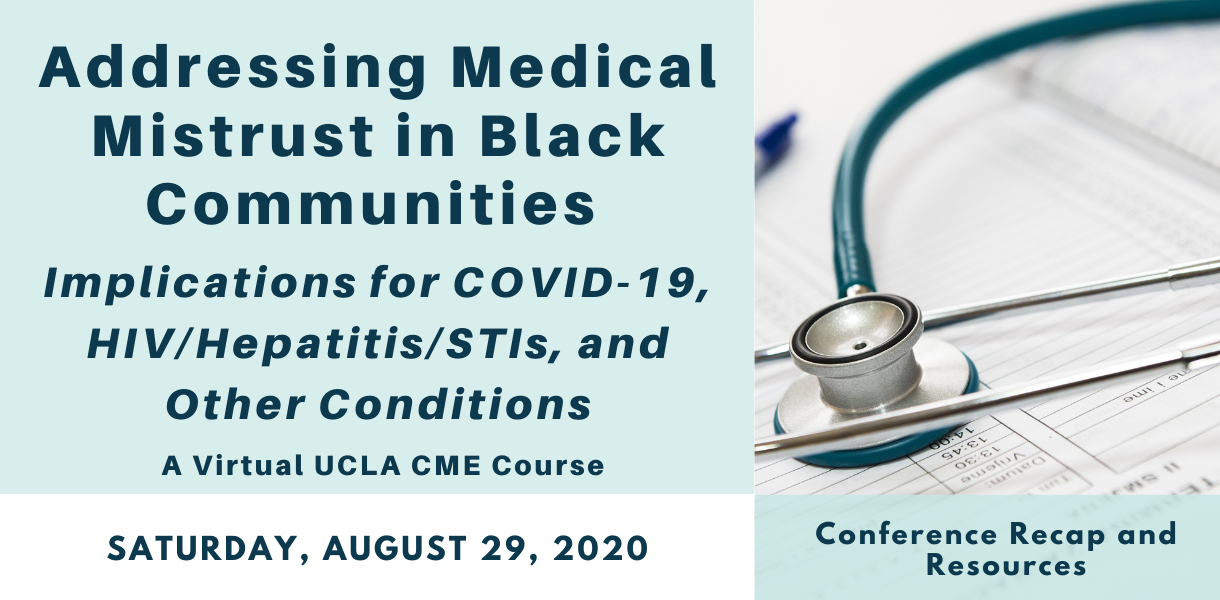Over 130 clinical providers including nurses, physicians, medical students, nursing students and some non-clinical providers registered and attended the virtual CME training, entitled “Addressing Medical Mistrust in Black Communities: Implications for COVID-19, HIV, Hepatitis, STIs and other conditions” Saturday, August 29th, 2020 from 8:30AM-1:15PM. This conference is a training for clinical providers aimed at highlighting and providing solutions to healthcare issues disproportionately affecting Black communities, and is the third in a series of programs focused at addressing medical mistrust and its related disparities in healthcare.
At the conclusion of the course, the objective was for all attendees to be able to:
- Describe the historical foundations of medical mistrust in Black communities.
- Describe the effects of medical mistrust on health care behaviors, HIV, COVID-19 and other health outcomes in Black communities.
- Discuss clinic and system level changes that foster patient trust.
- List the skills and resources needed to interact with patients in a manner that encourages healthcare engagement and improves health outcomes.
The CME training began with a welcome and course overview by CHIPTS Policy Core Director and Course Chair, Nina Harawa, PhD. Course faculty opening speaker, Oni Blackstock, MD, MHS set the stage for the conference with a presentation on the historical context of medical mistrust in Black Communities, entitled “How did we get here? – Historical perspectives”. Dr. Blackstock gave a brief overview of medical mistrust and touched on some of the origins of mistrust in the Black community. She further laid out the role of provider implicit bias in healthcare and addressed health inequities, especially in HIV, reproductive health and COVID-19. Following this opening presentation was a panel discussion among providers and community members to discuss some experiences of medical mistrust in the patient-provider relationship and some strategies to improve trust in the clinical setting. Course faculty speaker, Laura Bogart, PhD gave a presentation entitled, “Medical Mistrust, Discrimination, and Healthcare Provision in Black Communities: Recommendations for Providers”. The presentation covered definition of medical mistrust, some examples and how it contributes to health outcomes. She also went in depth to discuss recommendations for healthcare providers, organizations and communities. Faculty speaker, Sheldon Fields, PhD, RN, FNP-BC, AACRN, FAANP, FNAP, FAAN, gave a presentation entitled, “Black Communities, Medical Mistrust in the time of COVID-19” to highlight the racial disparities related to COVID-19 and challenges around telemedicine and mistrust during COVID-19. The presentation addressed how providers can approach patient issues with medications and experimental treatment in a manner that fosters trust. Gifty-Maria Ntim, MD, MPH, faculty speaker gave a presentation entitled, “Mistrust in the Context of HIV/Hepatitis/STD Prevention and Treatment” with an emphasis on the effects of medical mistrust on HIV, Hep C and STI outcomes and recommendations for addressing mistrust.
Attendees were grouped into three breakout sessions following the panel presentation, COVID-19 and HIV/Hepatitis/STD presentations respectively. During the breakout sessions, case studies including scenario/role-plays around medical mistrust were addressed with discussion around best communication strategies between patient and providers to increase trust. Finally, faculty speaker, Ace Robinson, MPH, MHL led a report back session by first giving a detailed summary of the day and providing an opportunity for attendees to share lessons learned from the breakout discussions and presentations. Faculty speakers also addressed audience questions during this period and gave final comments. Dr. Harawa brought the conference to a close with closing remarks and highlighting some important next steps.
A recording of this webinar is available on our YouTube channel, and linked below. A compiled list of resources pertaining to the training are also available below for download.
For additional questions, please contact CHIPTS at chipts@mednet.ucla.edu.
Event Documents
Download invitation letter and flyer: Medical Mistrust in Black Communities Training for Clinical Providers - Flyer
Download training syllabus: Addressing Medical Mistrust in Black Communities - Syllabus
CME Training Course Information [Download not found]
Speaker Bios [Download not found]
Resources
Dr. Laura Bogart’s Book Chapter Summary on HIV and medical mistrust: HIV & Medical Mistrust: A Summary
Medical Mistrust Reading List Addressing Medical Mistrust in Black Communities - Reference List
IAS report with recommendations for adjusting HIV service delivery in the age of COVID-19.
Presentation Slides
Historical Context of Medical Mistrust How did we get here? Historical perspectives - Slides
Strategies for Addressing Medical Mistrust Medical Mistrust Discrimination and Healthcare Provision in Black Communities Recommendations for Providers - Slides
Mistrust in the Context of COVID-19 Black Communities Medical Mistrust in the time of COVID-19 - Slides
Mistrust in the Context of HIV, Hepatitis and STIs Mistrust in the Context of HIV Hepatitis STD Prevention and Treatment - Slides
Videos

